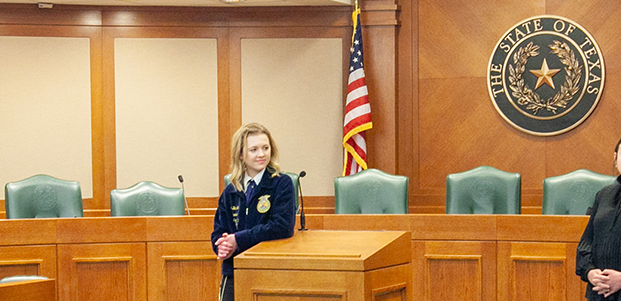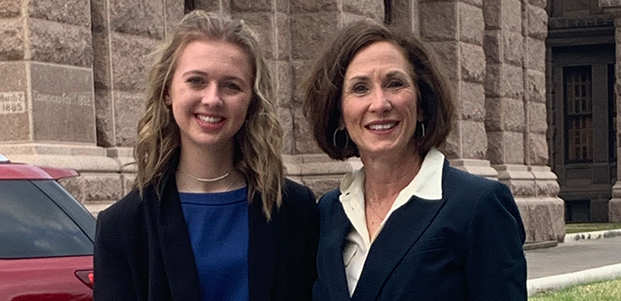Texas FFA Member Takes Legislative Steps to Increase Ag Literacy
Thursday, February 24, 2022 | Author: Texas FFA News
Last year, Flatonia FFA member Laura Beth James started researching the most probable cause of agriculture illiteracy in the United States. Through her extensive research, she concluded that it was due to the lack of basic agricultural education in the early stages of our public school system.
Armed with this knowledge, James took action and sent over 70 emails to elected officials asking them to help solve this problem. Within a few days, she heard back from Senator Lois Kolhorst, who was interested in hearing more about her research.
“One thing that became evident to me was that it’s our elected officials’ job to listen to our concerns and act on them,” said James. “We shouldn’t be afraid to ask for help where it’s needed!”
Together with Senator Kolhorst, they developed legislation on agricultural literacy.
“I want ag education to be available to students who might not be in FFA and 4-H,” said James.
Our advocacy efforts have the potential to shape both state and federal laws and budgets. There are many points in the legislative process to become more involved, and the impotence of our voices cannot be overstated.
With James’ notable success in the process as a high school student, we asked her to share some tips to help our members be successful and prepared advocates.

Research and Plan
The first step of advocacy is understanding the issue. In the planning stage, we should define what challenges we are facing and analyze the vital information needed to support our cause.
When James began her research, she discovered that two high school students in Georgia had similar concerns. She found out that they reached out to their local representatives, who then developed a bill regarding ag education in their state. This sparked her initial idea to take legislative action.
Reach Out
Reach out to experienced individuals, companies, and organizations in the field we are advocating for. These are essential connections for not only research but also for institutional knowledge. Form alliances and establish a working relationship.
James reached out to numerous organizations and individuals, including the coordinator of the agricultural education curriculum in Georgia. They provided detailed information regarding their program and their plans for future legislation.
Prepare
Facts, data, and figures all help make a case for our issue. Personal stories are also compelling and are often remembered, and these stories tend to profoundly impact how a legislator feels about an issue or bill.
James demonstrated this by dedicating time to drafting her testimony regarding the cause. She detailed her concerns, collected information from other states’ agricultural science education programs, gathered statistics and articulated her connection to the issue on hand. In addition, James brainstormed what her ideal solution would be.
Represent
The final step is to go out and represent your cause, industry, or association.
James gathered the contact information for every individual on the agriculture and education committees for both the Senate and the House of Representatives, so she could begin her email campaign advocating for agricultural literacy.
“Most of them are very responsive, especially by email, so that’s a great place to start,” said James. “If that doesn’t work, sending letters by mail and calling their office are other great ways to get in touch.”
James heard back from offices that found the topic interesting; this led to her ongoing working relationship with Senator Kolhorst.

Building relationships with legislators can open doors to work closely with them to get bills
introduced, to help in draft the language, shape the debate on the issues, and in getting
legislation signed into law.
Advocacy is most effective when there is a consistent, concerted effort on the part of many to communicate a singular message.
|